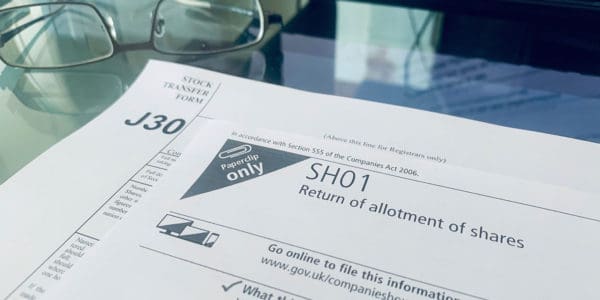A shareholder proxy is a person who is appointed to stand in for a shareholder at a general meeting of members. Essentially, the proxy acts as a representative or substitute for the shareholder in their absence by attending a general meeting and voting on their behalf.
We explore this topic in detail below, discussing the role of a proxy shareholder, the rights they are permitted to exercise, and how to appoint a proxy in a UK limited company.
The role of a shareholder proxy
Pursuant to the Companies Act 2006 (section 324), every member (shareholder or guarantor) of a company has the right to appoint another person as their proxy, if they are unable to attend a general meeting of members for any reason.
Upon their appointment, the proxy may exercise all or any of the absent member’s rights to attend, speak, and vote on their behalf at a general meeting of the company.
Proxy representation provides a means for shareholders to participate at general meetings through an intermediary of their choosing, rather than having to opt out of participation if they are unable to attend a meeting.
This ensures that all shareholders’ views and questions are put forth at every general meeting, and their votes are counted in any company decisions that are made during their absence.
The right to appoint a proxy is a statutory right. Companies cannot restrict or revoke the proxy rights set out in the Model articles, but they may provide enhanced proxy rights in bespoke articles of association or a shareholders’ agreement.
As such, every notice calling a general meeting must include a statement informing members of their right to appoint a proxy under section 324 of the Companies Act, in addition to any other proxy rights set out in the articles or shareholders’ agreement. Failure to include this information is an offence.
Members with multiple shareholdings
In the case of a company limited by shares, section 324(2) of the Companies Act provides that shareholders may appoint more than one proxy in relation to a general meeting, on the condition that “each proxy is appointed to exercise the rights attached to a different share or shares held by him, or (as the case may be) to a different £10, or multiple of £10, of stock held by him.”
This means that any member who holds more than one class of share (e.g. ordinary shares and preference shares) can appoint a different proxy for each share class. For example, if the shareholder has one ordinary share and one preference share, they can appoint two proxies, each of whom will have one vote at the meeting.
Joint shareholdings
Where shares are jointly owned by more than one member, only the first named shareholder has the right to appoint a proxy. The subsequently named shareholder(s) does not have this right.
Similarly, only the first named member has the right to vote at general meetings and sign written members’ resolutions. The purpose of such restrictions on joint shareholdings is to minimise a company’s administrative burden.
Corporate shareholders
Corporate shareholders (i.e. companies holding shares in other companies) have the same proxy rights as those afforded to individual shareholders.
However, a corporate shareholder will generally appoint a ‘corporate representative’ of the company to attend meetings on its behalf.
The representative has the same powers as a proxy, but there is no requirement for the corporate shareholder to submit a proxy form in advance of the meeting.
To appoint a representative, the corporate shareholder simply passes a board resolution and provides a certified copy of the relevant board meeting minutes (or written board resolution) to the representative, which they present at the general meeting.
The minutes serve as proof of their appointment and authority to represent the interests of the corporate shareholder.
What rights do proxies have?
Upon their appointment, the proxy has the same rights as the shareholder they are substituting, including:
- Attending the general meeting
- Speaking and asking questions at the meeting
- Voting on members’ resolutions at the scheduled company meeting, in accordance with the shareholder’s voting instructions
- Demanding, or joining in demanding, a poll on any matter put to a vote at the meeting
- Challenging on procedural grounds the decision(s) adopted at a general meeting
In addition to these statutory rights, companies may confer more extensive rights to shareholder proxies in their articles of association or a shareholders’ agreement.
Who can be a shareholder proxy?
The Companies Act 2006 simply refers to a shareholder’s right to appoint “another person”. Therefore, a shareholder can appoint any other person to serve as their proxy.
There is no statutory requirement for a proxy to be a shareholder, director, or secretary of the company. However, one should ideally ensure that any proxy has a sound understanding of the mechanics of the company.
It is not uncommon for shareholders to appoint the chairperson of the general meeting as their proxy, especially in situations where voting is to be held on a poll rather than on a show of hands.
Indeed, when preparing a proxy form, many companies will offer the chairperson as a default proxy. This provides the shareholder with the option to appoint the chairperson or select another individual of their choosing.
Shareholder proxy vs nominee shareholder
A shareholder proxy and nominee shareholder are not the same things, so it’s important not to confuse these two very different roles.
A proxy stands in for a member at a general meeting and has all the same rights as the shareholder during that time.
Whereas, a nominee shareholder is a shareholder in name only. The nominee is publicly registered as the owner of the shares to protect the identity of the beneficial (real) shareholder, but they have no actual shareholder rights.
However, since the introduction of People with Significant Control (PSC) legislation in 2016, members who hold more than 25% of a company’s ownership or voting rights are legally required to disclose their details on the public PSC register.
The purpose of this legislation is to increase transparency over who owns and controls UK companies, including any shareholders who use a nominee.
Can I appoint a proxy in a limited by guarantee company?
In companies without share capital, i.e. companies limited by guarantee, a member (guarantor) may appoint one proxy to stand in for them at a general meeting.
The statutory rights of guarantors and the process of appointing a proxy are the same as those which apply to shareholders in limited by shares companies.
How to appoint a shareholder proxy
A company’s articles of association usually set out the format of the proxy form and the requirements for delivery to the directors.
To validly appoint a proxy, the shareholder must send a ‘proxy notice’ to the director(s) at least 48 hours (two clear working days) before the relevant general meeting. This notice should contain the following information:
- Name and service address of the shareholder who is appointing the proxy
- Name of the person being appointed as that shareholder’s proxy
- The general meeting at which the proxy will be in attendance
The complete form must be signed by, or on behalf of, the shareholder who is appointing the proxy, or authenticated in such a manner that the directors can verify its authenticity.
These are the requirements set out in the Model articles of association. Some companies choose to impose more specific requirements in bespoke articles – e.g. the use of a particular proxy form, or different forms for different purposes.
Shareholders may file the proxy notice in writing to the company’s registered office address. Alternatively, they can file an electronic proxy form, unless expressly prohibited by any provision to the contrary in the company’s articles of association.
Many companies nowadays use electronic means to deliver communications, including notices of company meetings, written resolutions, minutes of meetings, and proxy forms. Aside from the convenience factor, digital communication is more efficient and provides a clear, secure audit trail.
Revoking a proxy form
If a shareholder wishes to revoke a proxy form and terminate the appointment of a proxy, they must notify the company in writing before the start of the relevant general meeting.
The notice to revoke the appointment will not take effect otherwise. Should the form reach the company after the start of the meeting, the shareholder may not attend the meeting in person instead of their proxy.
Thanks for reading
If you have any questions about this topic or anything else related to setting up and running a UK limited company, please leave a comment below or get in touch with our company formation team.
Please note that the information provided in this article is for general informational purposes only and does not constitute legal, tax, or professional advice. While our aim is that the content is accurate and up to date, it should not be relied upon as a substitute for tailored advice from qualified professionals. We strongly recommend that you seek independent legal and tax advice specific to your circumstances before acting on any information contained in this article. We accept no responsibility or liability for any loss or damage that may result from your reliance on the information provided in this article. Use of the information contained in this article is entirely at your own risk.












Join The Discussion
Comments (6)
Hello,
I’m wondering if you could please help me. My friend in Cyprus would like me to become a proxy director for a limited company as I live in the UK.
I’m worried about whether or not I as a director would incur any debts the company may accrue if they went into insolvency.
Thank you.
I look forward to hearing from you soon please.
Nile
Thank you for your kind comment.
Unfortunately as we are not regulated to provide legal advice, we are unable to provide advice on specific scenarios. We would recommend contacting a solicitor for further assistance.
Please accept our apologies for any inconvenience caused.
Kind regards,
The QCF Team.
Hi I have the articles of association of a company limited by guarantee from 1925 which states that members can’t appoint a proxy to vote on their behalf in a general meeting.
Is this article provision considered null and void and so does a member have a statutory right to appoint a proxy to vote at a general meeting under the Companies Act 2006 irrespective of the restriction in the articles to appoint a proxy?
Thank you for your comment, Andrew. Under CA 2006, a member of company is entitled to appoint another person as his proxy to to exercise all or any of his rights to attend and to speak and vote at a meeting of the company. As the company has Articles that have not been drafted under the most recent Companies Act, we would usually recommend adopting a new set of Articles to ensure that a company enjoys all the benefits afforded to them under the latest Act.
Kind regards,
The QCF Team
Can the proxy be the owner of the managing agents of a Right to Manage retirement company? Specifically, when the EGM was called to discuss the managing agents themselves?
Hi Elizabeth,
Thank you for your kind comment. Yes, if there are no restrictions in the shareholders agreement, the proxy can be the owner of the managing agents of a Right to Manage company. However, you should consider the percentage of voting powers the shareholder has, as you would need to avoid any unfair prejudice claims by minority shareholders which could arise depending on the circumstances.
We would recommend contacting a solicitor for further assistance.
Kind regards,
The QCF Team